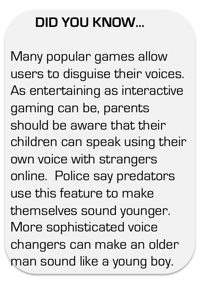 Gaming Concerns:
Gaming Concerns: Sex & Gaming
Sex & GamingA key concern about the popularity of video games is that so much of the content is hypersexualized. Pornography is often embedded in these games, allowing kids to engage in virtual or simulated sex acts to accumulate more points. The images of males and females depicted in these games are also often overtly sexual, and many games glorify violence and sexual exploitation.
Some games exist for the sole purpose of simulating sex—virtual sex games are often free and easy to access for kids; these games allow kids to create an online identity to explore sexuality in any place and in any way, including group sex, bestiality, and other fetishes.
"Parents need to understand how intricately linked the gaming industry and pornography industry are. More and more games have pornography embedded in them. If kids play online, that is a pornographer's heyday for marketing, grooming and hooking young consumers."
— Jill Manning, Ph.D. Marriage and Family Therapist
Children are often instantly drawn to the realistic images and fast-paced action online gaming has to offer. A first-person shootout or a high-stakes poker match gives a jolt of sensation that can become quite addictive. But, since predators prey where kids play, it is no surprise that online games are the new frontier for sexual predators. They use online gaming to connect with children and groom and target their next victim.
Online gaming allows predators to build shared online experiences and be a child’s defender or online teammate. Anyone has access to a wealth of information about a child by viewing a child’s gaming history. In so doing, predators have all the information they need to build trust and camaraderie in a way unique to gaming platforms.
Parents should become familiar with parental control features located on the game console that restricts who has access to a child’s gaming profile and allows parents to decide what games their kids can play, with whom they play and talk, and when they play online games.